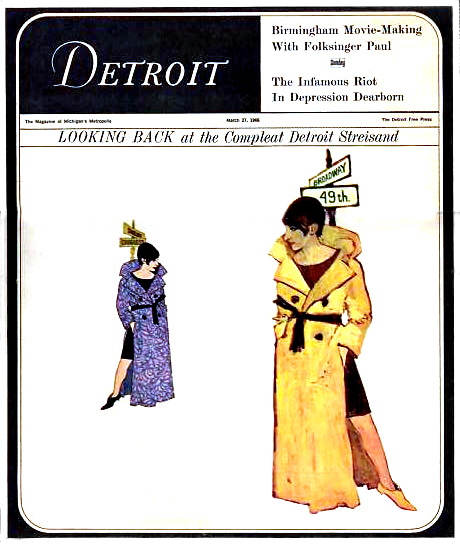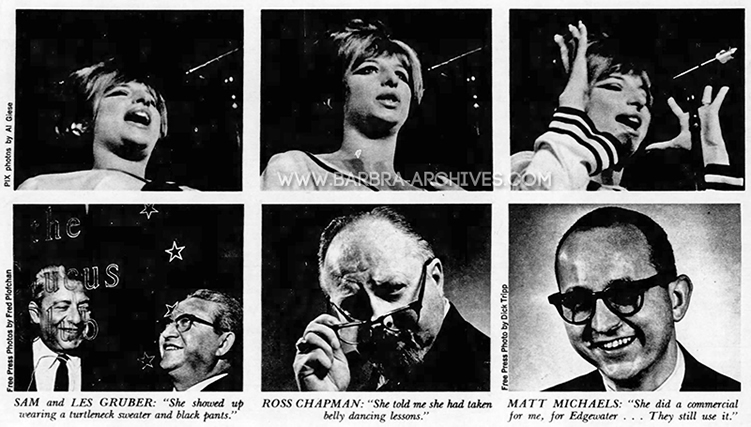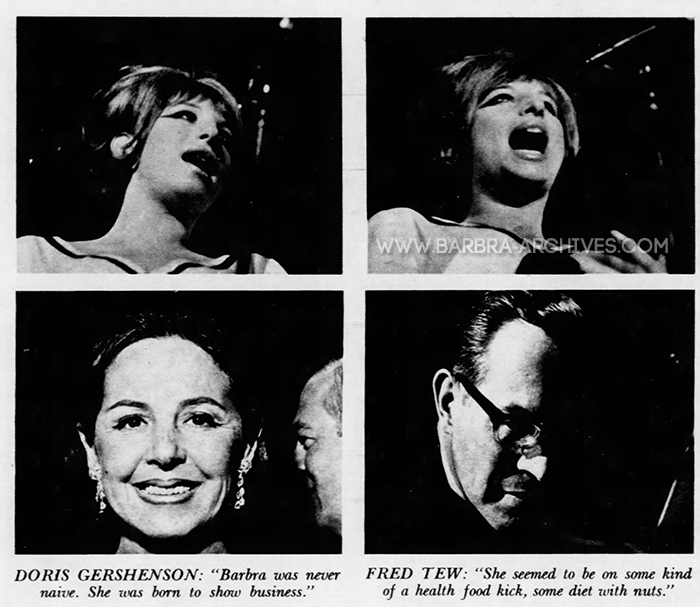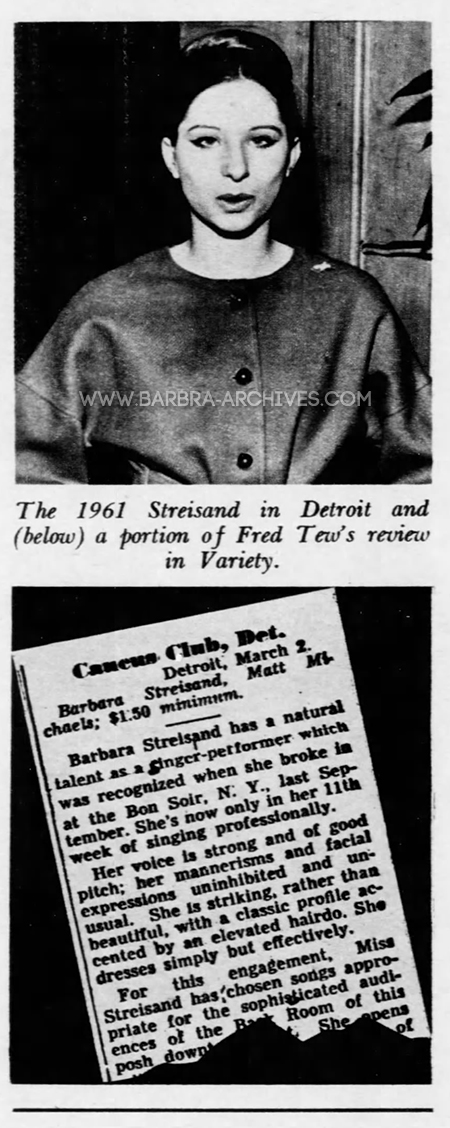Detroit — Magazine of Michigan's Metropolis
March 27, 1966

The Compleat Detroit Streisand : Portrait of Miss Somebody as a Nobody
BY BETTELOU PETERSON
"Watching her was like watching the first brush strokes in a picture. She was creating herself."— Lester Gruber
The spectators: Les and Sam Gruber, restaurateurs. Ross Chapman, publicist and former booking agent. Matt Michaels, pianist. Doris Fisher Gershenson, composer, daughter of a composer, and a show business veteran. Fred Tew, publicist and Detroit correspondent for "Variety." Joe Gore, former bartender, now manager of the Caucus Club.

LES GRUBER: “Back in early 1961, Irwin Arthur, a New York agent called me. He said, ‘I've just heard a girl at an amateur show at Bon Soir and I think she'd be good for you.' I have a lot of faith in Arthur’s taste. He knew what we were looking for in youngsters to work the Caucus Club. Everyone he sent me was what he said.
"I told him to send Barbra along. She opened Feb. 20 and played until March 27. We had her again for two weeks in April, and then, for four weeks in July and August."
ROSS CHAPMAN: "I was working for Delbridge-O'Halleran in the Fox Building then. It was Michigan law that club acts had to have a local contract and we handled the details for the Caucus Club and the London Chop House. It was about four or five o'clock the day she was to open when Barbra Streisand came into our offices to find out about her shows. We had to see that she was properly rehearsed.
"She had a big stack of dog-eared music under her arm and she looked . . . weird is the best word. Her hair needed combing and her clothes I can't describe. She and Matt Michaels, who was playing piano at the Caucus, went off to a back room to run over her material. In 10 or 12 minutes Matt was back, rather red in the face.
“‘My God, Ross,’ he said, ‘That broad only knows four songs.’”
MATT MICHAELS: "I don't think I've met a girl who looked more unqualified to be a singer in an intimate room. All she needed was a broomstick. She told us she'd worked 11 weeks at the Bon Soir in New York. I just don't believe it. When we asked her what she’d done with only four songs, she said she'd done the same songs every show. I was ready to give up but Ross smoothed things over."
ROSS CHAPMAN: "We told her she had four spots to do at the Caucus and she'd need at least 11 numbers. I asked how she was going to learn seven or eight numbers by nine that night—her first show. She looked me right in the eye and said, ‘I 'm a fast learner.’ Matt rehearsed her until eight, when he had to go to work. He got her up to 10 songs. By the time she left Detroit, she knew 80 songs.”
MATT MICHAELS: “She knew ‘When the Sun Comes Up’—the only real arrangement she had—‘Who's Afraid of the Big Bad Wolf,’ ‘When My Love Comes Back to Me,’ [Editor: Michaels probably means ‘Lover, Come Back to Me’] ‘When Sunny Gets Blue’ and part of a Jamaican-type thing that a friend of hers had done. But she knew parts of almost all the songs in that sheet music she had.”
SAM GRUBER: "She showed up for that first show wearing a black turtleneck sweater and black pants. We had to send her home to put on a dress.”
LES GRUBER: "She was weird looking, not her face, but her way of dress and her manner. She insisted she was 21—club performers were supposed to be then. Actually she was just over 18, but I didn't press her on it. The minute I heard her sing, I knew this girl had talent. When she stepped into that spotlight, it was magic.
“There was a lot of opposition to her. I would take people across the street from the Chop House to see her work. But, because of her appearance, they'd ask me, ‘Why did you get her?’"
DORIS GERSHENSON: "Mr. Gruber knows how interested we are in talent and he always asks us to openings. We saw Barbra the second or third night. She introduced a number by saying: ‘I'm going to sing a song by someone I've never met. Some day, when I get back to New York, I'm going to meet him. The song is, ‘When My Sunny Gets Blue’ by Marvin Fisher.’
“I jumped up and yelled, ‘Hey, that's my brother.’ I was impressed with Barbra immediately. I've been in this business a long time; I coached new people—Rita Hayworth, among them—for Columbia Pictures. We came back for more shows. I'd sit at the table and say to Barbra, ‘Do that song with a French accent.’ ‘Now imitate this or that singer.’ She could do it all. Her comedy talent was great, great. No one went for her like I did. I went off my rocker. I was born to this thing and I know …
FRED TEW: "I went over to review Barbra for 'Variety' about a week after she opened. She was a striking girl, dressed so inconspicuously I couldn't really remember what she had on.
“She came over to the table after the show. She didn't talk about my review. I don't like to talk about it. It can be embarrassing. She seemed to be on some kind of a health food kick, some diet with nuts. She was a real zealot, like a missionary trying to convert us.”

LES GRUBER: "Eat, oh how that girl could eat, hamburgers, steaks, anything. She was always hungry." (Pancho, the chef of the London Chop House, recalls Barbra's forays. She'd sweep by the salad table in the kitchen, grab a batch of green onions to munch, then go into the front to talk to the customers.)
DORIS GERSHENSON: “She was the biggest eater I ever saw. She would come to our house quite often. One time we were baking cookies. She ran in and ate the whole batch before they were cool from the oven.”
JOE GORE: "She'd come into the Chop House in late afternoon looking for Mr. Gruber. I thought she was the ugliest girl I ever saw in my life and her clothes made her look more ridiculous. There was a ratty fur coat in particular. She said she used to hunt pawn shops for her clothes. Anyone at the bar would always ask who she was.”
MATT MICHAELS: "She wore the fur coat and boots for one show.”
ROSS CHAPMAN: "There was a beige dress with some sort of sparkles. It looked like upholstery material. In fact, she said once that she was ‘dressed by Robinson Furniture’ because they’d given her some fabric.”
DORIS GERSHENSON: "She looked like scarecrow at times. She couldn't afford much in clothes. After all, she started out at $125 a week (that's scale for out-of-New York acts) and it hardly covers the cost of living at a hotel.”
ROSS CHAPMAN: "Fred Sweet, the manager of the Telenews Theater, told me he looked out of his box-office window one day and saw her trying to thumb a ride out Woodward. He knew her; he'd seen her at the Caucus. He went out and asked her what she was doing. She said she wanted to go to the Art Institute but she didn't have cab fare. He asked why she didn't take a bus and she said she didn't have that much either. He gave her the money. He told me, ‘Ross, she looked like she needed a bath.’"
LES GRUBER: "She earned more. She got a raise every week and by the end of the run she was making $350 a week. But she never spent anything on herself. I think she was sending it all home. I got the impression she was worried about her mother. She never talked about it. She never talked about Brooklyn. She insisted she was an Egyptian, as a way to explain her looks.”
ROSS CHAPMAN: "I asked her to tell me about herself so we could do a squib on her to hand out. She came from New York with no publicity at all, no pictures. She told me she was a Turkish Jew and she had taken belly dancing lessons.”
LES GRUBER: "She was full of fantasy. She was searching for herself. Watching her was like watching the first brush strokes in a picture. She was creating herself.
“She was a temperamental person, very often discouraged. There were days she'd be very depressed. I would tell her, ‘You're great. You’re going to be great. It takes time.’
“She did something very remarkable for a girl so young and inexperienced. She was booked for the old Tonight Show with Jack Paar and went to New York to do the show one Wednesday. Paar was so taken by her talent, he wanted to know where she was working. She told him, ‘The Caucus Club’ and he’d never heard of it. She said, ‘It’s right across the street from the famous London Chop House in Detroit.’
“Right on national television. I was so delighted that when she came back, I gave her a big kiss and $100.”

SAM GRUBER: “But she was chronically late for work. She was supposed to do her first show at about 10 p.m. but she'd never get in until 11 or later, throwing the load on the other performers who had to cover for her. She wasn't busy; she didn't have anything to do until show time. But she'd come in complaining she couldn't get a cab. A cab—she was staying only a few blocks away at the Henrose Hotel. Finally, one night I docked her pay for the performance she missed. She was half an hour early after that."
ROSS CHAPMAN: "Before the show and between performances, she'd sit at the bar. She liked champagne but she couldn't drink it. She'd sit on the stool with her arms and legs dangling and a funny little smile on her face."
MATT MICHAELS: "She was a very determined girl. She was sure she was going to be a star. But I doubted it because of her attitude, her belligerence. I didn't really care for her lack of self-discipline. If she didn't like the way the audience was listening, she'd walk out. One time, when people were too noisy for her, she told them: ‘God damn it, shut up.’”
LES GRUBER: "Working at the Caucus Club was a great thing for her. It taught her how to handle people. Because of her appearance she was very often heckled. But she learned how to handle them."
DORIS GERSHENSON: “My family knew Fanny Brice and from the beginning I was struck by Barbra's resemblance to Fanny, except for one thing. Barbra is Baby Snooks off stage and serious on. Fanny was just the opposite.
"We were fascinated by Barbra, by her hands and feet and the graceful way she used them, by her crazy hairdos. She and my son Ned had good times together. I remember one afternoon they came in from playing golf. It had rained and they were drenched and hilarious.
"I worked with her on some of my songs and on some arrangements. But Barbra never needed advice on how to pick songs. She knew what she could do. Barbra was never naive; she was born to show business. She could walk in front of 50,000 people and it was nothing to her."
MATT MICHAELS: "She worked harder than any girl I've ever met. People would comment on the innate grace of her hands. A lot of it was instinct, but I saw her work in front of a mirror four and five hours a day perfecting her gestures. We worked in the ballroom of a hotel. I was embarrassed to meet her in the lobby, she was dressed so strangely.
"She did a commercial for me, for Edgewater, the amusement park. She was a screamer in the background. They still use the commercial on radio every summer. The second time she was here, we worked up a whole act for her. I did some arranging—I just threw away a receipt for $67 that she paid for the arrangements. I suggested new songs. She wanted to learn the fundamentals of music but she was afraid of taking lessons, afraid she might lose what she had.
"She had impeccable taste in music. She never threw away a song. It was a pleasure to accompany her because she would sing a phrase correctly, the way it was written. She's singing the same way now; the way she sang when she started."
DORIS GERSHENSON: "We saw her at the Blue Angel in New York, after she had left Detroit. My brother introduced her agent to me and I told him that the girl would go far. The agent said, ‘Oh, I don't think so.’ So I bet him $10. He's never paid off.
"A year later, in March, 1962, we were in New York when she opened in 'I Can Get it For You Wholesale,' and stole the show. We saw her in the lobby of Sardis. She loved dresses by Norell and she was so proud because she finally had one. It must have come from a bargain basement; it was about six inches too long for her. She put her hand on her hip and asked, ‘Do you like it?’ She was so pleased. I couldn't tell her she looked like a scarecrow.
“Then the gang of first night hangers-on that inhabit Sardis caught sight of her and started to applaud. She walked into the room. She was on her way.”
END.
Related Pages: Barbra at the Caucus Club >>
